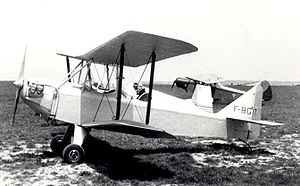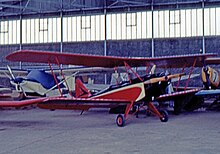| Leopoldoff Colibri | |
|---|---|

| |
| Leopoldoff L.6 Colibri at Chavenay near Paris in 1967 | |
| Role | Flight training and sporting aircraftType of aircraft |
| National origin | France |
| Manufacturer | Societe des Avions Leopoldoff |
| Designer | M.L. Leopoldoff |
| First flight | 27 September 1933 |
| Introduction | 1937 |
| Status | several flying in 2011 |
| Primary user | private owners and aero clubs |
| Number built | 125 |
The Leopoldoff Colibri (English: Hummingbird) is a French-built light sporting and trainer biplane of the 1930s.
Development
The Colibri was designed to meet demand for an economical two-seat tandem training and sporting biplane and the prototype L.3 Colibri, powered by a 35 hp (26 kW) Anzani engine, first flew at Toussus-le-Noble airfield near Paris in September 1933.
Series production of the L.3 Colibri fitted with the 45 hp (34 kW) Salmson 9Adb engine was started in 1937 by Aucouturier-Dugoua & Cie, followed by examples built by the Societe des Avions Leopoldoff, a total of 33 aircraft being completed before World War II.
Operational history

The Colibris served with aero clubs and private owners prewar, with several surviving the conflict. Production of six further Colibris was undertaken postwar by the Societe des Constructions Aeronautiques du Maroc in Morocco, receiving their designation CAM-1. Various engines were fitted in service, and the aircraft involved received modified type numbers.
In 2011, three Colibris were active in France and two were flying in the United Kingdom.
Variants
- L.3 prototype
- 35 hp (26 kW) Anzani engine (1 built);
- L.3 production prewar
- 45 hp (34 kW) Salmson 9Adb radial engine (33 built);
- L.31
- L.3 fitted with 50 hp (37 kW) Boitel 5Ao engine;
- L.32
- L.3 fitted with Walter Mikron III engine;
- CAM-1
- Colibri built postwar in Morocco (6 aircraft);
- L.53
- Colibri fitted postwar with 75 hp (56 kW) Minie engine;
- L.55
- Colibri fitted postwar with 90 hp (67 kW) Continental C90 engine;
- L.6
- Colibri fitted postwar with Minié 4.DF.28 Horus engine;
- L.7
- Colibri built postwar and fitted with a Continental A65-8S engine.
Specifications (L.55 Colibri)

Data from Airlife's World Aircraft, Aviafrance:Leopoldoff L-7 'Colibri', Aviafrance:Leopoldoff L-3
General characteristics
- Crew: one
- Length: 5.92 m (19 ft 5 in)
- Wingspan: 8.94 m (29 ft 4 in)
- Height: 2.11 m (6 ft 11 in)
- Wing area: 16.5 m (178 sq ft) (L-7)
- Empty weight: 300 kg (661 lb)
- Gross weight: 520 kg (1,146 lb)
- Powerplant: 1 × Continental C90-12F 4-cylinder air-cooledhorizontally-opposed piston engine, 67 kW (90 hp)
- Propellers: 2-bladed fixed-pitch propeller
Performance
- Maximum speed: 174 km/h (108 mph, 94 kn)
- Cruise speed: 153 km/h (95 mph, 83 kn)
- Range: 451 km (280 mi, 244 nmi)
- Rate of climb: 2.5 m/s (490 ft/min)
- Power/mass: 0.13 kW/kg (0.079 hp/lb)
References
- Notes
- Green, 1965, P. 51
- ^ Simpson 2001, p. 324
- Parmentier, Bruno (7 May 2005). "Leopoldoff L-7 'Colibri'". Aviafrance (in French). Retrieved 29 November 2019.
- Parmentier, Bruno. "Leopoldoff L-3". Aviafrance (in French). Retrieved 29 November 2019.
- Bibliography
- Green, William (1965). The Aircraft of the World. Macdonald & Co. (Publishers) Ltd.
- Simpson, Rod (2001). Airlife's World Aircraft. Airlife Publishing Ltd. ISBN 1-84037-115-3.